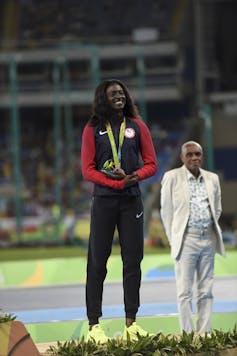
“It’s like I’ve got no strength left at all. Right now I can’t even summon the energy to drink a glass of water, it’s like I’ve been hollowed out from the inside. We spend so much time and energy preparing for glory, but now that I’m living with it I just feel weak and helpless.”
Anonymous sportsperson, weeks after competing in the Olympic Games.
Every athlete constructs their self-image through experiences, values and perceptions related to the intensity of their training and the level of their achievements. The value they attach to their expectations, efforts and suffering significantly influences their behaviour, motivation, memories and wellbeing.
But with the 2024 Olympic Games at an end, many of them will be struggling to find meaning beyond the realms of competition, with serious mental health consequences for some.
Mental dedication: a full-time job
According to data published by the International Olympic Committee in 2023, 33.6% of elite athletes suffer from anxiety and depression, and when their career ends, 26.4% experience severe mental health problems.
Athletes identify so strongly with their work and goals (whether they achieve them or not), and dedicate so much effort to training that they often overlook or justify the downsides: detachment from loved ones and close friends, difficulty maintaining a social life, and constant pressure to perform at the highest levels.
When the competitions end, or when athletes retire, they often feel lost: their day to day mental functioning is no longer governed or guided by immediate, ambitious challenges.

It is worth recalling the unfortunate case of American athlete Tori Bowie. A triple Olympic medallist at Rio 2016 and multiple world champion, she suffered a number of mental health problems while adjusting to life off the track, and died from complications in childbirth at the age of 32.
Another tragic example is Jesús Rollán, a double Olympic water polo champion who died following his retirement after falling from a rooftop, in what many believed was suicide.
Mental health: harder than the fight for medals
As soon as a competition ends, it is common to hear an athlete (whether they won a medal or not) refer to “what’s coming next”, “giving a little bit more”, or what they could have done better. It seems that their achievements and everything it took to get there do not deserve even the slightest recognition.
A psychological crash therefore awaits them the moment they stop doing what has made them valuable. Many experience a significant reduction in well-being, mood swings and feelings of emptiness, which pose more difficult challenges than the struggle for medals.
When they stop, an athlete’s routine, outlook and surroundings completely change, and the immediate goal that motivated their performance disappears. Moreover, the media attention or recognition that often gives meaning to their suffering evaporates.
This is the achievement trap, which is only within the reach of a chosen few. If not faced with a clear head, it can wear the athlete down and create a single-minded dependence on the expected or awaited reward.
It is akin to feeling like the pillars that support them are crumbling little by little, when in reality they are being put back together. The athlete believed that the only fight was on the track, the field, the racecourse, or in the ring or swimming pool, but now they have to face everyday struggles, which also require a high dose of effort and dedication.
A time to rediscover themselves
This is the moment when the real person emerges, adding (or emphasising) the values that have driven their sporting success, such as humility or responsibility.
Despite the personal and emotional discomfort that comes after a competition, the process of change (and it is an extraordinary life change) is a great opportunity for the athlete to grow and discover a better version of themselves. It is a moment of adjustment in which they recover from the vulnerability generated by a completely blinkered focus on their goals.
It will be a time to focus on their health (enjoying food, sleeping, therapeutic exercise, getting bored), to feel close to loved ones (loving and being loved without the need for praise), to perceive the usefulness of everything they do (creating routines at home and away, taking up new hobbies), to connect with nature, to experience new cultures and ways of living, and so on.
Finally, for sports professionals, retirement can be a great opportunity to explore different ways of seeing sport outside of top-level competition: to understand how children play, to observe how hard amateur athletes work, or how people recover use it to from illness or injury.
“When all the noise is over, that’s when you realise you’ve been fighting for much more than medals: you’ve been pushing yourself for something that it sometimes feels like you didn’t even decide to do, and didn’t even know why you wanted it.”
Anonymous sportsperson, weeks after competing in the Olympic Games.
Juan González-Hernández receives funding from the Spanish Ministry of Universities.
This article was originally published on The Conversation. Read the original article.







